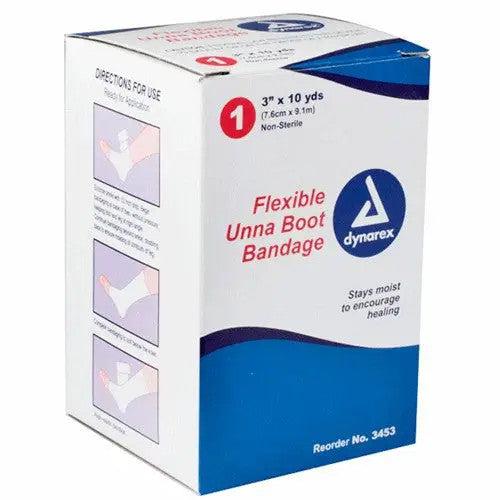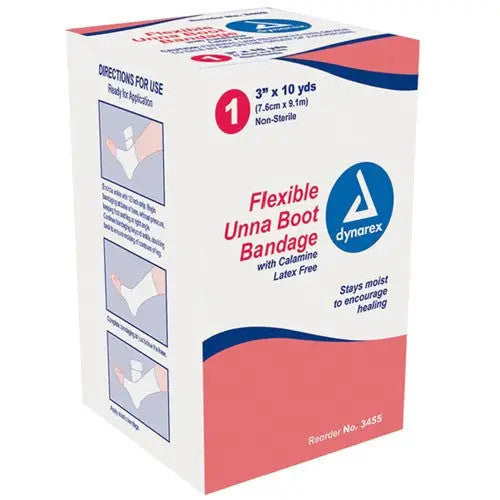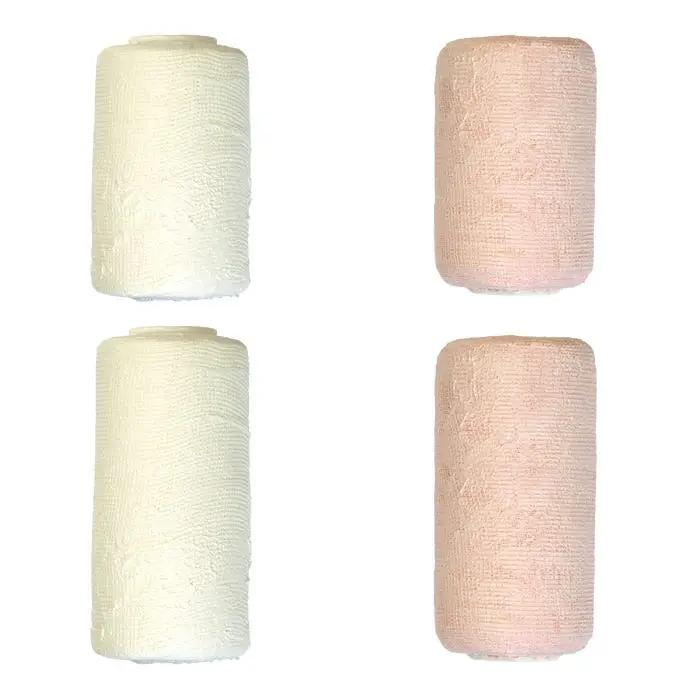Unna Boot Wraps are a type of compression wrap that is used to treat various medical conditions. They are made of a cotton/elastic blend and are applied with a wrap or bandage. Unna Boot Wraps are used to treat conditions such as venous leg ulcers, edema, and lymphedema.
Benefits for using Unna Boot Dressing Bandages
- Allows better airflow over the wound for improved healing.
- Provides adjustable levels of compression for on-going care and management of a wide variety of skin conditions.
- Bandages fold down to cover and protect small and hard to access areas.
- Prolongs dressings’ functional period without complications like infections or undesired sensations.
- Soft padding included in the bandage helps to protect the skin area.
- Keeps the dressing firmly in place and reducing risk of slipping.
- Hypoallergenic, latex free material does not irritate skin.
- Water-resistant design helps to maintain a clean and sterile environment around the wound.
- Easy practical application and removal process with help of velcro, reduces the risk of re-injuring the patient.
- Less moisture retained, enabling dressing changes to occur without dressing disruption.
Unna Boot Dressing Bandage are an important aid in the treatment of various wounds like leg ulcers, and pores. Unna Boots are basically compressive dressings based on a zinc and gelatin paste. This paste coated onto a cotton batting need to be compressed into a rolled bandage during an application. To put it on, the Unna Boot Dressing Bandage has to be stretched over the wounds and extremities so the compressing of a revolving roller bandage is then done in layers compared to a uniform stretching of a figure 8 bandage. The Unna Boot Dressing Bandage is then reinforced and held closely together by clips and a conformable elastic bandage. Applying a Unna Boot Dressing Bandage helps maintain pore shape by supporting pools of exudate and the Unna Boot Dressing Bandage Institute recommends into in a Unna Boot every two weeks.
Instructions on How to Apply Unna Boot Dressing Bandage
1. Start by inspecting the foot and lower leg for signs of infection, such as redness, swelling, heat, bleeding, broken skin, or pus. If signs of infection are present, consult a medical professional for treatment before starting treatment with Unna boot dressing bandage.
2. Clean the foot and lower leg. Make sure to remove any dirt, debris or any discharge from the skin. Gently pat the area dry.
3. Cut the Unna boot to size and shape. The size and shape should completely cover the affected area and the surrounding uninjured skin.
4. Spread out the Unna boot on a clean surface. Apply zinc oxide paste to one side of the Unna boot, spread the paste evenly.
5. Place the Unna boot zinc oxide paste side up over the prepared area. Gently insider protein paste to one side of the Unna boot.
6. Pull the sides of the Unna boot closed. Use a bandage to wrap around the top and bottom of the Unna boot to keep it secure on the leg. Secure the bandage with tape and dab any excess zinc oxide paste off with a cotton swab.
7. Leave the Unna boot in place for no more than 24 hours at a time. During that time, inspect the Unna boot often for any signs of breaking down of the paste.
8. Remove the Unna boot and clean and the surrounding skin. Discard the Unna boot and apply a new one if needed.
Dynarex Unna Boots wrap is a flexible, wet compression bandage used on pressure ulcers, eczema, strains and injuries. Available impregnated with calamine or plain. The Unna boot gauze rolls made with non raveling gauze that is impregnated with zinc, glycerin. These two ingredients give the skin a gentle, soothing feel, while promoting a clean, moist healing environment.
Features:
- Graduated compression therapy
- Impregnated gauze bandage
- Plain or with Calamine
- Premoistened application
- Non Raveling
- Helps manage edema
- Promotes the return of venous blood flow
Information About Venous Ulcers
Venous ulcers are believed to account for 70% to 90% of all chronic leg ulcers. These ulcers can be difficult to heal. The chance of acquiring a venous ulcer increases with age. Women are three times more likely than men to develop venous leg ulcers. In some studies, 50% of patients had venous ulcers that persisted for more than 9 months, and 20% had ulcers that didn't heal for more than 2 years. After healing, more than 60% of the patients experienced a recurrence of venous ulcers.
Where can I use Unna Boot Dressings?
A Unna Boot Bandage is ideal for ambulatory treatments of stasis leg ulcers, lymphatic edema, thrombo-phlebitis, eczema of the leg, minor fractures, sports injuries, sprains and strains.
How to Apply Unna Boot Compression Dressings
Start with encircle the ankle with a 12 inch strips of the bandage. Next, begin bandaging at the base of toes, without pressure, keeping foot and leg at right angle. Continue bandaging beyond ankle, doubling back to ensure molding of contours of leg. Keep the compression bandage in place to achieve maximum wear time.




